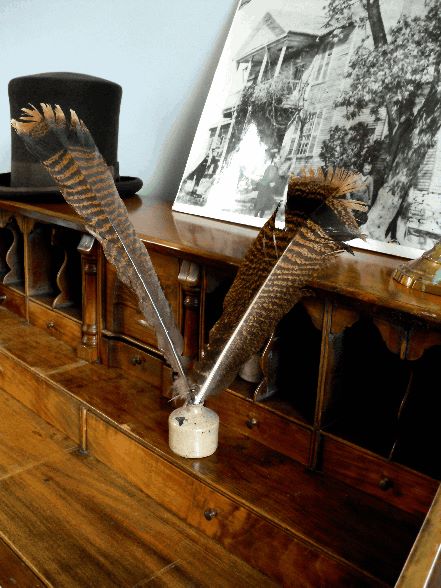Revisited
Words Which Have Changed Their Meaning

 Hawk quills, from which we get the term pen. The word nice has had a rather more varied history. It had its original meaning of "foolish" from the literal meaning of the Latin word nescius, "ignorant," from which it was derived. Gradually it came to mean "foolishly particular about small things;" and we still have a similar use of the word, as when we say a person has a "nice taste in wines," or is a "nice observer," or speak of a "nice distinction," by which we mean a subtle distinction not very easily observed. But this is, of course, not the commonest sense in which we use the word. By nice we generally mean the opposite of nasty. A "nice" observer was a good observer, and from this kind of idea the word nice came to have the general sense of "good" in some way. Nice is not a particularly dignified word, and is little used by good writers, except in its more special and earlier sense. It is, perhaps, less used in America than in England, and it is interesting to notice that nasty, the word which in English always seems to be the opposite of nice, is not considered a respectable word in America, where it has kept its earlier meaning of "filthy," or absolutely disgusting in some way. Again, the word disgust, by which we express complete loathing for anything, used merely to mean "dislike" or "distaste." In the same way, the word loathe, by which we mean "to hate" or feel the greatest disgust for, originally meant merely "to dislike." The stronger meaning came from the fact that the word was often used to describe the dislike a sick person feels for food. Every one knows how strong this feeling can be, and it is from this that loathe and loathsome took the strong meaning they now have. Curiously enough, the adjective loath or loth, from the same word, has kept the old mild meaning. When we say we are "loth" to do a thing, we do not mean that we hate doing it, but merely that we feel rather unwilling to do it. In Old English, too, the word filth and its derivative foul were not quite such strong words as dirt and dirty. Again, the words stench and stink in Old English meant merely "smell" or "odour." One could then speak of the "sweet stench" of a flower; but in the later Middle Ages these words came to have their present meaning of "smelling most disagreeably."  Man with several handkerchiefs on him. We saw how the taking of the word fol from the French, meaning "foolish," caused the meaning of several English words which before had this meaning to be changed. The coming in of foreign words has been a very common cause for such changes of meaning. The word fiend in English has now a quite different meaning from its original meaning in English, when it simply meant "enemy," the opposite to "friend." When the word "enemy" itself was borrowed from the French, the word fiend came to be less and less often used in this sense. In time fiend came to be another word for devil, the chief enemy of mankind. But in modern times we do not use the word much in this sense. It is most often now applied to persons. It sounds rather milder than calling a person a "devil," but it means exactly the same thing. The word stool came to have its present special meaning through the coming into English from the French of the word chair. Before the Norman Conquest any kind of seat for one person was a "stool," even sometimes a royal throne. The word deer also had in Old English the meaning of "beast" in general, but the coming in of the word beast from the French led to its falling into disuse, and by degrees it became the special name of the chief beast of chase. Again, the Latin word spirit led to the less frequent use of the word ghost, which was previously the general word for spirit. When spirit came to be generally used, ghost came to have the special meaning which it has for us now--that of the apparition of a dead person. A great many words have changed their meaning even since the time of Shakespeare through being transferred from the subject of the feeling they describe to the object, or from the object to the subject. Thus one example of this is the word grievous. We speak now of a "grievous wrong," or a "grievous sin," or a "grievous mistake," and all these phrases suggest a certain sorrow in ourselves for the fact described. But this was not the case in the time of Queen Elizabeth, when it was decreed that a "sturdy beggar," a man who could work but begged instead, should be "grievously whipped." In this case grievously merely meant "severely." On the other hand, the word pitiful, which used to mean "compassionate," is no longer applied to what we feel at seeing a sad thing, but to the sadness of the thing itself. We do not now say a person is pitiful when he feels sorry for some one, but we speak of a "pitiful sight" or a "pitiful plight." But there are some words which have changed so much in meaning that their present sense seems to have no connection with their earlier meaning. The word pity itself is used still in both ways, subjectively and objectively. A person can feel "pity," and there is "pity" in the thing for which we feel sorry. This is the sense in which it is used in such expressions as "Oh, the pity of it!" The word hateful once meant "full of hate," but came to be used for the thing inspiring hate instead of for the people feeling it. So, painful used to mean "painstaking," but of course has no longer this meaning. One very common way in which words have changed their meanings is through the name of one thing being given to another which resembles it. The word pen comes from the Latin penna, "a feather;" and as in olden days the ordinary pens were "quills" of birds, the name was very good. We still keep it, of course, for the steel pens and gold pens of to-day, which we thus literally speak of as feathers. Pencil is a word with a somewhat similar history. It comes from the Latin penicillus, which itself came from peniculus, or "little tail," a kind of cleaning instrument which the Romans used as we use brushes. Pencil was originally the name of a very fine painter's brush, and from this it became the name of an instrument made of lead which was used for making marks. Then it was passed on to various kinds of pencils, including what we know as a lead-pencil, in which, as a writer on words has pointed out, there is really neither lead nor pencil. The word handkerchief is also an interesting word. The word kerchief came from the French couvre-chef, "a covering for the head." Another similar word is one which the Normans brought into England, curfew, which means "cover fire." When the curfew bell rang the people were obliged to extinguish all lights and fires. The "kerchief" was originally a covering for the head. Then the fashion arose of carrying a square of similar material in the hand, and so we get handkerchief, and later pocket-handkerchief, which, if we analyse it, is rather a clumsy word, "pocket-hand-cover-head." The reason it is so is that the people who added pocket and hand knew nothing of the real meaning of kerchief.  A bowl of treacle, a favourite item among the people of southern Sri Lanka. There are several words which used to mean "at the present time" which have now come to mean "at a future time." This can only have come about through the people who used them not keeping their promises, but putting off doing things until later. The word soon in Old English meant "immediately," so that when a person said that he would do a thing soon he meant that he would do it "instantly." The trouble was that often he did not, and so often did this happen that the meaning of the word changed, and soon came to have its present meaning of "in a short time." The same thing happened with the words presently and directly, and the phrase by-and-by, all of which used to mean "instantly." Presently and directly seem to promise things in a shorter time than soon, but by-and-by is a very uncertain phrase indeed. It is perhaps because Scotch people are superior to the English in the matter of doing things to time that with them presently still really means "instantly." In all the examples we have seen of changes in the meaning of words it is fairly easy to see how the changes have come about. But there are some words which have changed so much in meaning that their present sense seems to have no connection with their earlier meaning. The word treacle is a splendid example of this. It comes from a Greek word meaning "having to do with a wild beast," and this seems to have no connection whatever with our present use of the word treacle as another word for syrup of sugar. The steps by which this word came to change its meaning so enormously were these. From the general meaning of "having to do with a wild beast," it came to mean "remedy for the bite of a wild beast." As remedies for wounds and bites were, in the old days, generally thick syrups, the word came in time to mean merely "syrup," and lastly the sweet syrup which we now know as "treacle." Another word which has changed immensely in its meaning is premises. By the word premises we generally mean a house or shop and the land just round it. But the real meaning of the word premises is the "things already mentioned." It came to have its present sense from the frequent use of the word in documents drawn up by lawyers. In these, which very frequently dealt with business relating to houses, the "things before mentioned" meant the "house, etc.," and in time people came to think that this was the actual meaning of premises, and so we get the present use of the word.  Clerk busy working at his desk. The word humour is one which has changed its meaning very much in the course of its history. It comes to us from the Latin word humor, which means a "fluid" or "liquid." By "humour" we now mean either "temper," as when we speak of being in a "good" or "bad" humour, or that quality in a person which makes him very quick to find "fun" in things. And from the first meaning of "temper" we have the verb "to humour," by which we mean to give in to or indulge a person's whims. But in the Middle Ages "humour" was a word used by writers on philosophy to describe the four liquids which they believed (like the Greek philosophers) that the human body contained. These four "humours" were blood, phlegm, yellow bile (or choler), and black bile (or melancholy). According to the balance of these humours a man's character showed itself. From this belief we get the adjectives--which we still use without any thought of their origin--sanguine ("hopeful"), phlegmatic ("indifferent and not easily excited"), choleric ("easily roused to anger"), and melancholy ("inclined to sadness"). A person had these various temperaments according as the amount of blood, phlegm, yellow or black bile was uppermost in his composition. From the idea that having too much of any of the "humours" would make a person diseased or odd in character, we got the use of the word humours to describe odd and queer things; and from this it came to have its modern meaning, which takes us very far from the original Latin. It was from this same curious idea of the formation of the human body that we get two different uses of the word temper. Temper was originally the word used to describe the right mixture of the four "humours." From this we got the words good-tempered and bad-tempered. Perhaps because it is natural to notice more when people are bad-tempered rather than good, not more than a hundred years ago the word temper came to mean in one use "bad temper." For this is what we mean when we say we "give way to temper." But we have the original sense of "good temper" in the expression to "keep one's temper." So here we have the same word meaning two opposite things. Several words which used to have a meaning connected with religion have now come to have a more general meaning which seems very different from the original. A word of this sort in English is order, which came through the French word ordre, from the Latin ordo. Though the Latin word had the meaning which we now give to the word order, in the English of the thirteenth century it had only the special meaning (which it still keeps as one of its meanings) of an "order" or "society" of monks. In the fourteenth century it began to have the meaning of "fixed arrangement," but the adjective orderly and the noun orderliness did not come into use until the sixteenth century. The word regular has a similar history. Coming from the Latin regula, "a rule," its modern general meaning in English of "according to rule" seems very natural; but the word which began to be used in English in the fourteenth century did not take the modern meaning until the end of the sixteenth century. Before this, it too was used as a word to describe monastic orders. The "regular" clergy were priests who were also monks, while the "secular" clergy were priests but not monks. The words regularity, regulation, and regulate did not come into use until the seventeenth century. Another word which has now a quite different meaning from its original meaning is clerk. A "clerk" nowadays is a person who is employed in an office to keep accounts, write letters, etc. But a "clerk" in the Middle Ages was what we should now more generally call a "cleric," a man in Holy Orders. As the "clerks" in the Middle Ages were practically the only people who could read and write, it is, perhaps, not unnatural that the name should be now used to describe a class of people whose chief occupation is writing (whether with the hand or a typewriter). People in the Middle Ages would have wondered what could possibly be meant by a word which is common in Scotland for a "woman clerk"--clerkess. The words which change their meanings in this way tell us the longest, and perhaps the best, stories of all. PT |
| Revisited - Words Which Have Changed Their Meaning | |||||||||||
| Writer: | Elizabeth O'Neill | ||||||||||
| Images: | |||||||||||
| |||||||||||
| Sources: | |||||||||||
| |||||||||||
All images are Copyright - CC BY-SA (Creative Commons Share Alike) by their respective owners, except for Petey, which is Public Domain (PD) or unless otherwise noted.
comments powered by Disqus


















